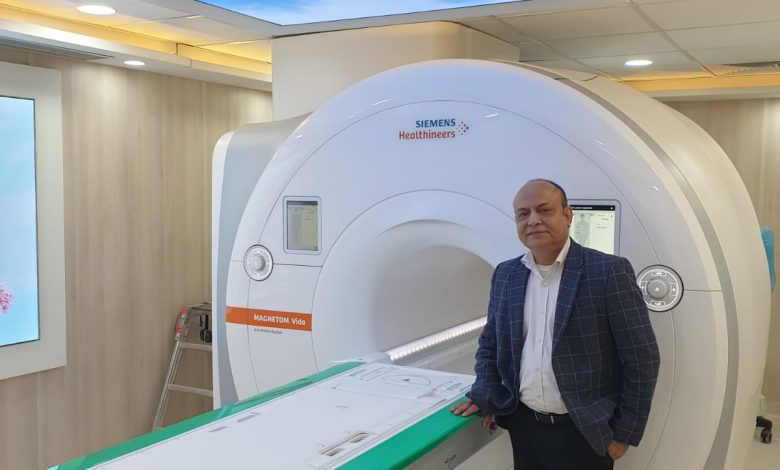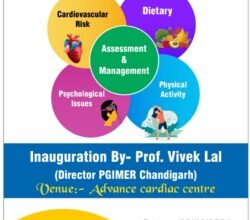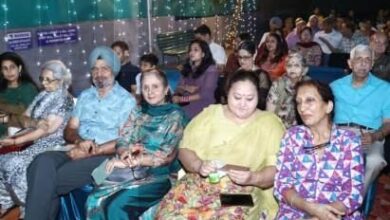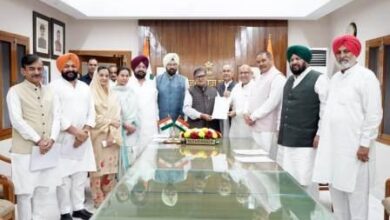Latest State of the Art 3 Tesla MRI machine launched at PGI- to further boost MRI services at the Institute

The latest version of the globally most advanced 3 Tesla MRI machine has recently
been launched in the Department of Radiodiagnosis and Imaging at PGI, stated
Prof.M.S. Sandhu, Head, Deptt. of Radiodiagnosis and Imaging.
This will greatly help the patient care services at the institute and the long waitlist for
MRI appointments at PGI will also be reduced with the help of this new MRI machine he
said.
There is currently No 3 Tesla MRI in Northern India with this much powerful
hardware and software. The state-of-the-art powerful hardware combined together
with Artificial Intelligence based advanced applications (software) will help all the
clinical specialties of the hospital to get better diagnosis and treatment planning, said
Prof. Paramjeet Singh who was instrumental in putting together this vital and very
high end installation.
With a magnetic field strength that is twice as powerful as conventional 1.5 Tesla
MRI, the new 3 Tesla MRI Machine provides extremely clear and vivid images of the
human body. The new 3Tesla MRI Machine is ideal for Brain, Vascular,
Musculoskeletal, small bone imaging and also functional imaging of the brain.
The Patient comfort and Experience will drastically improve with features like Wide
bore and In-bore lighting for soothing experience. With upto 64 channel imaging in
single scan field of view, high-resolution whole-body imaging will be possible. The
Unique Biomatrix technology understands diversity in patient bodies and adapts the
scanning accordingly. The “Quiet Suite” for upto 96% noise pressure reduction
during scanning will comfort the patient. Artificial intelligence assisted planning for
consistent superfast scanning will support the technical staff operating the system.
The special “Accelerate” package drastically reduces the patient scanning times
while widely improving the resolution of the examination being done, stated Prof.
Paramjeet Singh.
The advance MRI imaging capability on the new machine will give early insights for
cancer detection and characterization, epilepsy and seizure disorders, sports injuries
and rehabilitation, liver, pancreas, kidney, intestinal and other abdominal disorders,
Spine anomalies, nerve compressions, white matter anomalies in the brain, neonatal
and pediatric disorders, cardiac morphology and viability, and whole body screening
will all benefit to name a few.
The system is equipped with advanced imaging for all body parts including High
resolution Brain tractography, functional MRI, Spectroscopy, perfusion MRI, 4D Flow
measurements, Liver elastography, fat quantification and automated liver volumetry,
non-contrast perfusion and non-contrast vascular imaging, advanced compressed
sensing and simultaneous multi-slice imaging to name a few. For diagnosis and
treatment of cancer patients applications like High Resolution Diffusion imaging,
tumor load calculation and MRI guided Breast Biopsy will now be available stated
Prof. Paramjeet Singh.
Earlier OPD patients had to wait 7-8 months for getting MRI appointments, because the
admitted ward patients at PGI would get preference for MRI appointments’, which are
done in 2-3 days. With the additional help of the Gamma Knife MRI which was launched
at PGI 5 months ago in the NeuroSurgery Department, the Radiology Department has
worked extra shifts on this machine to reduce the OPD patients MRI waiting time, which
has been brought down previously from around 7-8 months earlier, and is currently
around 2 months. With the launch of the new 3T MRI machine the waitlist of OPD MRI
patients will further decrease, said Prof. Sandhu.
It is pertinent to mention that all the Government of India specialized schemes like
Ayushman Bharat, JLL and BPL, and also all the Cancer patients at PGI, are getting
priority OPD MRI appointments in just 2-3 days. The Department of Radiodiagnosis has
made extra efforts to reduce the waiting time for all Radiology services including OPD
MRI scans to meet the heavy post covid patient referrals from all across Northern India
over the last 8-10 months, said Prof. Sandhu.




